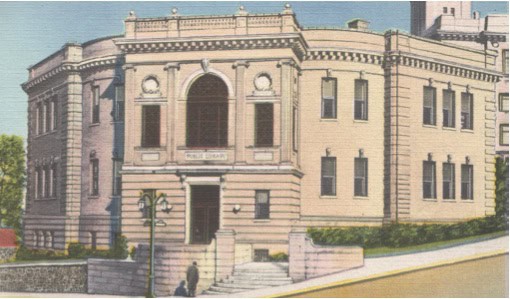
The Carnegie Library in Yonkers, which closed its doors forever in 1981 and was torn down
By Mary Hoar, City of Yonkers Historian, President Emerita Yonkers Historical Society, recipient of the 2004 Key to History, Member of the Yonkers Landmarks Preservation Board, and President Untermyer Performing Arts Council
Monday, April 29th
April 29, 1942. Yonkers National Defense Vocational Training courses opened to women!
Because of the dwindling number of men available to work at “attack plants,” Defense Training Coordinator Dr. Lawrence Ashley announced the school would be opened to women; three hundred women registered for training the first day. Twelve interviewers spoke to each enrollee, registering them for the ten-week-course. Women were assured of defense industry jobs at Eastern Aircraft, where the expected workforce of 4,000 would be 80% female. Other area companies where the women could do defense work were Alexander Smith Carpet, Habirshaw Cable and Wire, Otis Elevator and Anaconda Wire and Cable Companies.
April 29, 1943: The Yonkers Railroad Company hired its first African American trolley operator; Walter Wilson of Touissant Avenue was to be trained to work on the Park Avenue line.
Tuesday, April 30th
April 30, 1933: Welfare Commissioner Nicholas Ebbitt announced Yonkers’ quota for the Citizens’ Conservation Corps, created by the Federal Government as unemployment relief while aiding in national reforestation, was 305 people.
April 30, 1937: Aristotle Pharasles, manager of the Park Hill and the Broadway Theaters, announced he asked the theater owner stop showing German-made films weekends at the Broadway Theater. Several Yonkers groups and the American League Against War and Fascism protested the showings, stating the films were an insult to the people of Yonkers, people who were opposed to Nazi government activities.
Wednesday, May 1st
May 1, 1854: The Yonkers Library Association opened in the Wheeler Block to give young men of Yonkers the opportunity for mutual improvement and association.
May 1, 1939: Several Park Hill property owners were surprised to learn a deed for the former Valle Mansion on Park Hill Avenue in Lowerre Summit was filed with County Clerk Harold Mercer; this confirmed the rumor the mansion would be used as a “heaven,” or a residence for Father Divine’s followers. Some neighbors were upset, but soon-to-be next door neighbor Maurice Blinken said he was not. He stated, “If Father Devine has taken the house, I might observe he is a neighbor, also, of President Roosevelt. I feel honored to be placed in the same class as the President.”
Blinken, grandfather of Secretary of State Antony Blinken, was former President of the Yonkers Board of Education and Chairman of the Yonkers Public Library Board.
Thursday, May 2nd
May 2, 1920: The Salvation Army left its home at 11 North Broadway for its new rooms on the second floor of the Copcutt Building at 13 Warburton Avenue.
May 2, 1945: The United States Armed Services liberated three Yonkers men from German prison camps: Private John Hayes of Vineyard Avenue, Private Robert Fitzgerald of Ashburton Avenue and Corporal Walter Wujcki of Maple Street. All three returned home in a short time.
May 2, 1981: The much loved Carnegie Library closed its doors forever.
Friday, May 3rd
May 3, 1921: Heavy blasting on top of the Palisades to build the new Hendrik Hudson Drive directly across from Yonkers caused damage to many homes in North Yonkers, especially the Warburton Avenue area. The many explosions broke dishes, windows, pictures, and other household items.
May 3, 1931: Sir Hubert Wilkins, owner of the submarine Nautilus making practice dives in the Hudson off Yonkers, was notified by the Norwegian government it was considering banning his planned trip to the North Pole. Norway felt it could be an unnecessary risk of human life.
Saturday, May 4th
May 4, 1927: Yonkers native George Snowden, Yale University School of Fine Arts graduate and art instructor, was awarded the 1927 American Prixe de Rome for sculpture, a three-year residency at the Academy of Rome with all living expenses; this award was considered the most prestigious art prize of the time and fulfilled Snowden’s dream of studying art abroad. He later received the Royal Academy Order of Merit and elected to the National Academy of Design. Among his notable works are the “Labors of Man” for the 1939 New York World’s Fair and sculptures on the Bronx County Courthouse. He had more than 100 “public placements” over his career and was considered by many to be a central father of the American Arc-Modernist movement.
Snowden studied at Yale under Rodin scholar Robert Eberhard and was appointed an instructor of sculpture in 1926 before he graduated. Rodin bequeathed his sculpting tools to Eberhard; Eberhard passed them on to Snowden. Snowden passed them to his own talented daughter, Mary Louise, known professionally as M. L. Snowden.
May 4, 1953: The US Air Force contracted with Otis Elevator Company to provide radar bombsight and navigation trainers. The company planned to rent space outside its Yonkers and Harrison works.
Sunday, May 5th
May 5, 1911: A NY State Senate hearing on Senator McClelland’s bill for annexing Yonkers, Mount Vernon, Pelham and New Rochelle to New York City was postponed after many residents of the communities traveled to Albany to speak on the legislation.
May 5, 1965: Yonkers Transit Company went on the streets with 60 perfumed buses! The idea was to mask the harsh odor of burning diesel oil with the additive Malabate PR-105. When tested a few days earlier, the city officials, drivers and mechanics agreed it was an improvement. Mayor John Flynn stated it was “a step in the right direction for exploring the problem of air pollution.” Most said the new odor was a combination of hospital antiseptic and floral fragrance. When driver Ray Embree entered the company garage unaware of the testing, he commented, “Where are the girls?”
Questions or comments on this column? Email YonkersHistory1646@gmail.com.
For information on the Yonkers Historical Society, Sherwood House and upcoming events, please visit our website www.yonkershistoricalsociety.org, call 914-961-8940 or email info@yonkershistoricalsociety.org





